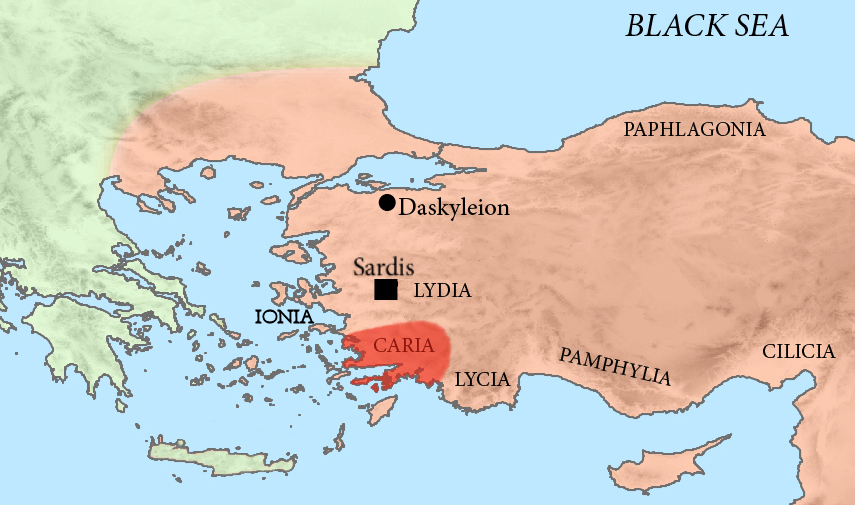Lygdamis II of Halicarnassus on:
[Wikipedia]
[Google]
[Amazon]
 Lygdamis II ( gr, Λύγδαμις) (ruled c.460-454 BCE) was a
Lygdamis II ( gr, Λύγδαμις) (ruled c.460-454 BCE) was a
 Lygdamis II ( gr, Λύγδαμις) (ruled c.460-454 BCE) was a
Lygdamis II ( gr, Λύγδαμις) (ruled c.460-454 BCE) was a tyrant
A tyrant (), in the modern English usage of the word, is an absolute ruler who is unrestrained by law, or one who has usurped a legitimate ruler's sovereignty. Often portrayed as cruel, tyrants may defend their positions by resorting to rep ...
of Caria
Caria (; from Greek: Καρία, ''Karia''; tr, Karya) was a region of western Anatolia extending along the coast from mid-Ionia (Mycale) south to Lycia and east to Phrygia. The Ionians, Ionian and Dorians, Dorian Greeks colonized the west of i ...
during the 5th century BCE, under the Achaemenid Empire
The Achaemenid Empire or Achaemenian Empire (; peo, 𐎧𐏁𐏂, , ), also called the First Persian Empire, was an ancient Iranian empire founded by Cyrus the Great in 550 BC. Based in Western Asia, it was contemporarily the largest em ...
. His capital was in Halicarnassus
Halicarnassus (; grc, Ἁλικαρνᾱσσός ''Halikarnāssós'' or ''Alikarnāssós''; tr, Halikarnas; Carian: 𐊠𐊣𐊫𐊰 𐊴𐊠𐊥𐊵𐊫𐊰 ''alos k̂arnos'') was an ancient Greek city in Caria, in Anatolia. It was located i ...
. He was the grandson of Artemisia
Artemisia may refer to:
People
* Artemisia I of Caria (fl. 480 BC), queen of Halicarnassus under the First Persian Empire, naval commander during the second Persian invasion of Greece
* Artemisia II of Caria (died 350 BC), queen of Caria under th ...
, and son of Pisindelis
Pisindelis ( grc, Πισίνδηλις), ruled c.460–450 BCE, was a tyrant of Caria, from its capital Halicarnassus, under the Achaemenid Empire. He was the son of Artemisia I of Caria, and part of the Lygdamid dynasty.
He was said to be a yo ...
, the previous tyrant.
Lygdamis assassinated the poet Panyassis
Panyassis of Halicarnassus, sometimes known as Panyasis ( grc, Πανύασις), was a 5th-century BC Greek epic poet from Halicarnassus in the Persian Empire (modern-day Bodrum, Turkey).
Life
Panyassis was the son of Polyarchus ( grc, Πολ ...
, uncle of famous historian Herodotus
Herodotus ( ; grc, , }; BC) was an ancient Greek historian and geographer from the Greek city of Halicarnassus, part of the Persian Empire (now Bodrum, Turkey) and a later citizen of Thurii in modern Calabria ( Italy). He is known f ...
, in 461, which forced Herodotus to leave his native city of Halicarnassus, fleeing to the island of Samos
Samos (, also ; el, Σάμος ) is a Greek island in the eastern Aegean Sea, south of Chios, north of Patmos and the Dodecanese, and off the coast of western Turkey, from which it is separated by the -wide Mycale Strait. It is also a separate ...
.
After the death of Lygdamis, circa 454 BCE, Halicarnassus joined the Athenian alliance, known as the Delian League
The Delian League, founded in 478 BC, was an association of Greek city-states, numbering between 150 and 330, under the leadership of Athens, whose purpose was to continue fighting the Persian Empire after the Greek victory in the Battle of Pl ...
. At that time, Halicarnassus started to appear on the Athenian tribute quota lists.
From 395 BCE, Caria would again fall under the control of the Achaemenid Empire and be ruled by a new dynasty of local tyrants, the Hecatomnids
The Hecatomnid dynasty or Hecatomnids were the rulers of Caria and surrounding areas BCE.
The Hecatomnids were satraps (governors) under the Achaemenid Empire, although they ruled with considerable autonomy, and established a hereditary dynas ...
.
References
{{reflist Ancient Halicarnassians Lygdamid dynasty Achaemenid satraps of Caria 5th-century BC rulers in Asia 454 BC deaths